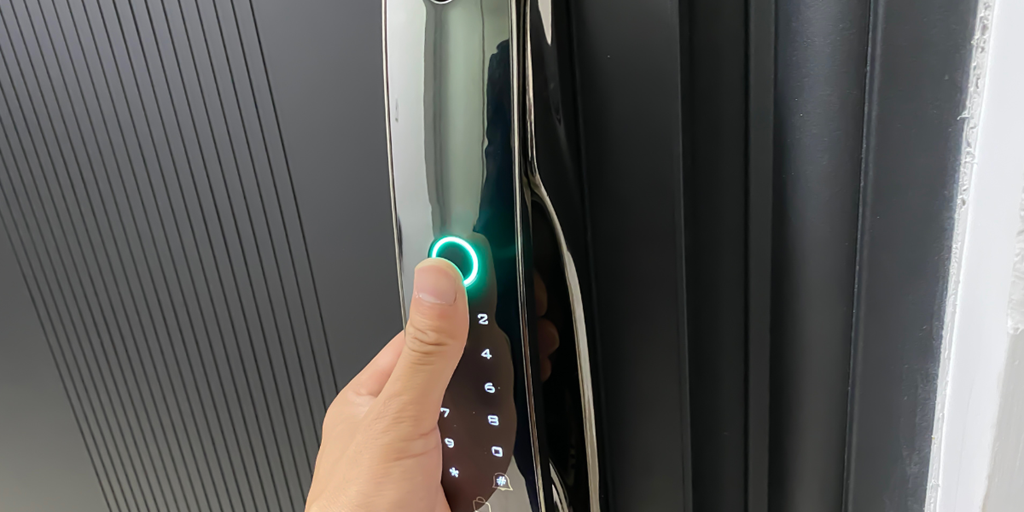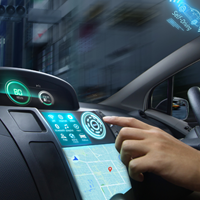The password-free future of cybersecurity lies in biometric authentication. This authentication method leverages our physical and behavioral characteristics to verify our identities, to gain access to physical spaces and digital resources.
The global biometric market is experiencing growth projected to exceed USD 50 billion by 2024. Non-AFIS (Automated Fingerprint Identification System) technology is leading the way capturing a share of over USD 18 billion. The biometrics industry in North America is also on the rise in security and government sectors anticipated to claim more than 30% of the market by 2024.
Biometric authentication comes in two main types:physiological and behavioral measurements. The first focuses on our body's distinct features, like fingerprints, eye characteristics, and facial shape. The second looks at how we behave, including voice recognition, signature style, and even our walking gait.
Imagine a world where DNA matching, fingerprint scans, facial recognition and voice identification unite to safeguard our assets. Biometric authentication is revolutionizing security!
However while these advancements offer heightened safety measures we must also consider privacy concerns. Who has access to our data? For what purpose? With the rapid progress of AI and quantum computing technologies comes potential cyber threats and risks of identity theft becoming a common concern.
As we explore the potential of authentication it's important to remain vigilant, in protecting our privacy and security. By doing so we can fully unlock the capabilities of this technology.
Biometric Authentication Outlook for 2023
Multi Factor Authentication
In the year 2023 multifactor authentication is expected to become the norm, for ensuring access control security. In addition to the passwords, people will also use face recognition or fingerprint biometrics as an extra layer of protection. This method, which was previously used mainly for safeguarding banking information or medical records, will now be increasingly utilized to secure everyday application due to the growing risk of cybercrimes.
Post-Quantum Biometric Authentication
According to Nils Gerhardt, the Chief Technology Officer, at Utimaco passwords are no longer reliable when it comes to security. Their vulnerability to exploitation makes them an easy target for individuals especially considering that 70% of people reuse passwords. This practice becomes even riskier when password files are obtained by actors who can then launch brute force attacks. To address this issue new hardware devices are emerging as a solution. These devices offer passwordless authentication through the use of biometrics and advanced protocols.
While biometrics such as fingerprints and facial recognition have become integrated into our lives they still come with their set of risks in terms of interception. However a Nordic cyber tech company called Pone Biometrics has developed a card based system that effectively overcomes these limitations. This system utilizes a fingerprint reader embedded within the card itself acting as a microcomputer. By verifying identities with data transfer this card ensures both convenience and security.
It's important to note that in order to prepare for the threat posed by quantum computers it is crucial to integrate quantum algorithms into these systems. By combining security cards with quantum resistance capabilities we can envision a future where passwords are no longer necessary, for authentication purposes.
EU Digital Wallets
The EU is making strides towards a digital wallet and identity ecosystem through its eIDAS project, with feedback pouring in from experts and stakeholders. Finland is on the path to implementing its national digital identification system while Switzerland is exploring the development of a decentralized digital identity platform. The feedback on the draft Architecture and Reference Framework (ARF) for eIDAS has been extensive covering aspects such as certification of wallets, data standards and Trusted Execution Environments. Experts emphasize the need for guidelines, standardization and seamless compatibility across all EU member states. In the meantime CSC in Finland supports the proposed ID but also highlights the significance of user comprehension and transparent fee structures. In Switzerland there is an effort to establish an ecosystem that encompasses various digital credentials such as electronic IDs, digital signatures and mobile driving licenses.
Ethical Biometrics and Data Privacy
As the field of biometric solutions continues to expand there will be a growing emphasis on ethical practices in this area. Users will increasingly prioritize trust in the providers and will want to know more about where their data is going. Will demand reassurances that their data is being safeguarded in compliance with privacy laws.
Additionally they will seek assurance that the biometric systems being used are free from any biases. In 2023 there will be expectations for standards in security within the industry, which will contribute to users' confidence in using biometric authentication systems.
As biometric solutions continue to grow, people will increasingly value ethical biometrics. Trust in providers will be crucial, and users will seek assurance that their data is protected in accordance with privacy laws and that the biometric systems used are unbiased. Stricter expectations for ethical security will shape the industry's standards in 2023, promoting user confidence in biometric authentication systems.
Challenges of Biometrics
Potential Misuse of Biometric Information
As the use of technologies such, as facial recognition, fingerprints and iris scans continues to increase it is important to acknowledge certain risks. One of these risks is the emergence of "Deep fakes" and unauthorized access to information by hackers. Additionally there is a concern about companies accessing consumer data, including location information. To address these concerns the FTC (Federal Trade Commission in the United States) emphasizes that companies should carefully consider these challenges before collecting data and be transparent with consumers about the associated risks. On another note, consumers also have a role in this matter. They can make informed choices about using their biometric information and weigh the benefits against the risks of potential compromise or misuse. If they ever suspect their information's security or privacy has been compromised, they can turn to the authorities and report their concerns.
Legal and Ethical Considerations
Biometric technology, which uses unique personal characteristics for identification, raises ethical concerns about protecting our data. For example, the European Convention of Human Rights safeguards the citizen's rights to keep sensitive information, especially about our health, private and secure. While some situations may require using this data for public health reasons without our consent, it's crucial to handle it transparently and lawfully. If not, there could be serious consequences like discrimination, identity theft, or fraud, affecting us economically and socially. As biometrics becomes more common in medical services, we must be aware of the risks to our rights and privacy. Striking a balance between technology and our rights is essential for maintaining trust and fairness.










 Angry Nerds (Poland)
Angry Nerds (Poland) Angry Nerds (USA)
Angry Nerds (USA) Angry Nerds (Canada)
Angry Nerds (Canada)



